Thank you for the mention, Dr. Jayne — we appreciate the callout, the kind words and learning more about the…
News 9/23/15
Top News
ONC’s just-released five-year “Federal Health IT Strategic Plan” says the federal government learned from HITECH that federal entities need to integrate their health IT planning and the need to move to a person-centric health IT infrastructure. ONC revised its plan based on stakeholder comments that it was too focused on data and systems rather than how participants in the healthcare system can work together. Nothing in it stood out as interesting, other than that I didn’t see any direct reference to ONC’s proposed Health IT Safety Collaboratory.
Reader Comments

From Long Time, First Time: “Re: Dr. Jayne’s post on Theranos. Is this what passes for critical thinking in the doctor’s lounge? I doubt Theranos or Ms. Holmes has any more obligation to educate patients than your profession does, which after centuries of privilege, takes little accountability for their ignorance.” I think Dr. Jayne will respond.
From K-Dog: “Re: Volkswagen emissions scandal. Did anyone else immediately think of EHR certifications?” Volkswagen sets aside $7.3 billion for recalls and penalties and the CEO of its US division admits that “we have totally screwed up” after the company was caught programming the software in its diesel cars to under-report their emission levels that were up to 40 times the allowed amount. I don’t know if there’s an EHR equivalent unless a vendor either earned certification fraudulently (which would be the certifier’s problem) or the once-certified certified product no longer meets the requirements. The one and only de-certification was because the company went out of business (as did the original certification body, CCHIT).
From Former Epic: “Re: Epic. Anyone grossed out by the passive-aggressive media blitz it’s running via its clients? Refusing to exchange more than minimum data and forcing providers to install EHR systems again is irresponsible and motivated by hubris. Legacy Health, no one is ‘snake oiling’ us into believing that Epic isn’t doing the right thing. They are showing us with their hypocritical rhetoric. Stop being a mouthpiece for a big vendor that can fight its own battles.” CIOs at Epic-using health systems can’t win. If they say anything good about the company, people who don’t like Epic for whatever reason accuse them of being mindless lemmings or cunning company shills. Not only that, people who wax pedantic on what they think is wrong with Epic marginalize those provider CIOs who actually chose and use the system, as though hands-on expertise is by definition tainted by self-interest. I don’t know of any other industry where sideline observers are assumed to have more credibility than paying customers. If healthcare IT were Yelp, we would allow each restaurant to be reviewed only by self-appointed experts who haven’t actually eaten there.

From Rumor: “Re: Cohealo founder Mark Slaughter. Removed from the website – out as CEO?” Apparently – his LinkedIn profile says he’s gone as of this month and is now a “healthcare entrepreneur.” According to the supply chain technology company’s executive page, he’s been replaced as CEO by co-founder and COO Brett Reed, whose pre-Healo career was at Burlington Coat Factory.
From Feeling Bamboozled: “Re: Sagacious Consultants. Announced to employees Tuesday night that they’re being bought by Accenture. Transition over the next 10 days, according to leadership.” Unverified since it’s late in the day Tuesday, but I’ll probably get confirmation or denial on Wednesday.
HIStalk Announcements and Requests

Bird Blitch was incorrect in tagging his $100 donation to my DonorsChoose project as “not being much, but it adds up.” It actually provided a lot for the elementary school class of Ms. Thomas from Jonesboro, GA, which will get an iPad Mini, a kid-proof case, and a bean bag chair to create a Math Exploration Station, with matching funds my anonymous vendor executive and that total amount doubled again by the Smarties candy folks. I even had enough money left over to give Mrs. Lantinga’s eighth-grade science class in Battle Creek, MI two science magazine subscriptions to replace the five-year-old copies they were using for their weekly class discussions about science “current” events, with matching money from my vendor person as well as the Bill & Melinda Gates Foundation. One of Mrs. Lantinga’s advisory council students explained why they hoped their grant requests would be funded on behalf of their 125 classmates: “I think that the rest of the kids will look at us as leaders because we saw a problem and came up with an idea for a solution and that’s what a leader would do."
Here’s one of the most valuable lessons I learned in my MBA program. Sunk costs (money already spent) shouldn’t affect go-forward decisions. In a a real-life example from my own recent experience, I bought inexpensive tickets for a football game that I didn’t really care about other than to enjoy the game-related activities outside the stadium. Torrential rains caused those pre-game activities to be cancelled. Should I go anyway since I’d already bought the ticket? Correct answer: no. I wasn’t going to get the money back either way, so the only consideration was whether I’d rather spend the time doing something that didn’t involve huddling miserably under a poncho. When making a decision about anything in business or otherwise, forget historical financial or emotional investments and evaluate your options starting only with right this minute. In other words, don’t throw good money after bad.
Webinars
October 7 (Wednesday) 1:00 ET. “Develop Your Analysts and They’ll Pay for Themselves.” Sponsored by Health Catalyst. Presenters: Peter Monaco, senior business intelligence developer, Health Catalyst; Russ Stahli, VP, Health Catalyst. It takes years for analysts to develop the skills they need to build reports and dashboards that turn data into valuable insights. This webinar will describe how to cultivate those analytical skills, including technical prowess and adaptive leadership. Leaders will learn how to develop a culture that fosters improvement, how to encourage analysts to develop the right skills, and ways to remove the barriers that stand in their way.
Here’s the video of Tuesday’s webinar from The Breakaway Group titled “Just Step on the Scale: Measure Ongoing EHR Success and Focus Improvements using Simple but Predictive Adoption Metrics.”
Acquisitions, Funding, Business, and Stock
Phynd Technologies secures $1.1 million in Series A equity funding to accelerate growth of its provider management platform, raising its total to $3.1 million.
Specialty EHR vendor Modernizing Medicine raises $38 million in Series E financing, increasing its total to $87 million.
Ascension invests $18 million in data analytics vendor Atigeo and will use its technology as a customer. It’s not a healthcare-specific product.
Wolters Kluwer says it will acquired India-based digital health solutions startups.
Sales

John Muir Health (CA) chooses Health Catalyst’s enterprise data warehouse and analytics platform.
Sharp HealthCare (CA) chooses Qpid Health for PQRS compliance.
Duke Clinical Research Institute (NC) will implement VitalHealth Software’s QuestLink to allow clinical trials patients to report their outcomes electronically.
Memorial Medical Group (IL) chooses the eClinicalWorks EHR.
People


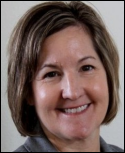
Healthgrades makes three executive hires: Keith Nyhouse (TeleTech) as chief marketing officer, Mayur Gupta (Kimberly-Clark) as SVP/head of digital, and Kate Hyatt (ProBuild Holdings) as SVP/chief people officer.

AxisPoint Health, the former McKesson Care Management division that was sold earlier this year, names Ron Geraty, MD (DermOne) as CEO.
Announcements and Implementations
AirWatch announces that its mobility management solution is iOS9 ready.
Government and Politics

Adventist Health System (FL) will pay $119 million to settle a whistleblower lawsuit that accused it of paying doctors kickbacks for their referrals, the largest settlement ever for referral improprieties. Three former employees of Park Ridge Hospital (NC) will divide up to $30 million of the settlement.
The FDA announces formation of a Patient Engagement Advisory Committee made up of experts and a single consumer representative that will advise it on complex issues.
England’s Chief Inspector of Hospitals recommends that Cambridge University Hospitals Trust be placed under remedial oversight after finding significant problems with its finances, staffing, and its Epic rollout that caused clinical issues. The inspector says employees are caring and skilled, but hospital executives have “lost their grip on some of the basics.”
I didn’t catch this story two weeks ago: CMS gives California Medicaid a waiver allowing it to keep submitting ICD-9 claims after the October 1 switch to ICD-10. California started a six-year, $1.6 billion upgrade of its Medicaid systems in 2010, but it’s still testing the Xerox-developed changes for ICD-10. CMS will allow California and three other states to submit ICD-9 codes that it will try to convert to ICD-10 equivalent using a crosswalk table.
A new IOM report called “Improving Diagnosis in Health Care” makes these health IT recommendations:
- Software vendors and ONC should ensure that health IT systems used for diagnosis demonstrate usability, incorporate human factors knowledge, integrate measurement capability, integrate with clinical workflow, provide clinical decision support, and facilitate timely information flow among patients and providers.
- ONC should require that IT systems allow effective flow of information across care settings to support diagnosis by 2018, including meeting interoperability standards.
- HHS should require health IT vendors to have their software independently evaluated to determine if it could cause adverse effects on diagnosis.
- HHS should help users exchange information about their experience with health IT design and implementation that could effect diagnosis.
Privacy and Security
NYU professor Arthur Caplan frets about the medical privacy of sensor-containing pills for NBC News, saying the just-approved tablets (he calls them “snitch pills”) from Otsuke Pharma and Proteus Digital Health “will let third parties snoop on you and nag you if they see you are not doing what the doctor ordered.” I think his concerns are unfounded and I would instead consider the broader problem of the societal cost of patients who intentionally don’t do what’s good for them. It’s like “intrusive” laws that require motorcyclists to wear helmets so the rest of us aren’t stuck footing the bill when their inevitable helmet-free crash sends them to years of expensive ventilator care. I think smart pills are an overly intrusive and expensive way to address patients who don’t take their meds as prescribed, but I seriously doubt that anyone is going to poach the entirely uninteresting data they create for evil purposes.
Other

The 32-year-old former hedge fund manager turned CEO of a drug company that acquired a 60-year-old AIDS drug for $55 million and then increased its price from $14 per tablet to $750 says the drug costs only $1 per tablet to manufacture, but it was underpriced compared to other expensive drugs on the market. He responded to a tweet questioning the price hike with, “You are such a moron.” The Wall Street Journal noted in April the trend of aggressive drug companies buying patents of drugs sold by competitors and then jacking up their prices by multiples, with one company raising the price of two old heart drugs that still had no generic competitors by 525 percent and 212 percent the day they bought them. In related news, a drug company that bought rights to an old tuberculosis drug and then increased its price 20-fold gives the drug back to the non-profit that previously owned it just three weeks before, with both organizations stung by public outcries of price gouging. The most interesting aspect of all of these examples is that the drugs are off patent, yet nobody makes a generic, leading to one of two conclusions: (a) the market for the drugs is so limited that the few patients who need them have to pay the entire cost of manufacturing and marketing them; or (b) generic manufacturers have been bribed not to jump in. Either is a big problem for overall healthcare costs.
Peer60’s new EDIS report finds that hospital EDs are getting significantly more visits and one-third of them plan to switch ED information system vendors in the near future. Most interesting to me is that the integrated vendors (Allscripts, Cerner, Epic, and Meditech) are the most likely to lose clients. Meditech has big-hospital market share, but almost zero mind share, which sounds like an opportunity for someone. Usability was the #1 user-reported problem by far at 49 percent, but one-third of respondents say there’s nothing their vendor can do to keep them because they’re switching to their EHR vendor’s EDIS anyway. Nearly half of respondents say their increased ED volume is due to the lack of available primary care.
Howard Zwerling, MD, president of ComChart Medical Software, announces that he’s taking his company’s EMR off the market because its underlying technology (Filemaker, various browser plug-ins, and fax programs) makes upgrades too slow and unreliable. He takes shots at the EHR market on the way out the door, saying that evidence that healthcare IT is effective is lacking and “the large EMR/EHR vendors now have undue influence over the Federal Government’s HIT initiative.” I might offer a counterpoint – the predictable problems the physician had as a spare bedroom programmer trying to write, sell, and support an EMR as a side job is precisely why those big vendors are succeeding and he failed. He didn’t have a problem with the government and its EHR industry bailout when he was selling his system, saving his parting shot for when he shut down and left his customers in a lurch (after reassuring them otherwise – above). This necessary thinning of the EHR herd is exactly what the industry needs in getting to fewer but better vendors as we finally graduate from opportunists who incorrect believe that the software business is easy and then cut and run when they find it isn’t.
Medical school professor Aaron Carroll, MD, MS writes about health IT from his perspective as a chronic disease patient in the New York Times, observing that his health plan keeps changing lab providers that don’t share his information, faxes are flying around because labs don’t connect electronically with practices, mail-order pharmacies require starting over when the health plan changes to a new one, and a communications nightmare happens when he tries to coordinate getting his same old prescriptions and lab orders repeated as required by the insurance company.
The local paper explains the newly implemented visitor policy of Halifax Health (FL), which will print photo-bearing visitor badges after first checking the visitor against a sexual predator list.
Weird News Andy calls this story “Shark Snark,” which he found on “the highly respected site E-Online.” More people are killed taking selfies than are killed by sharks. WNA helpfully looked up the ICD-10 codes, W56.41 (bitten by a shark) and W56.42 (struck by a shark). Only one deals with selfies, Y93.C2 (activity, hand held interactive electronic device). WNA laments, “When, oh when are we finally going to have a coding system that accurately reflects the modern world in which we live?”
Sponsor Updates
- AirStrip will exhibit at the Southeast Pediatric Cardiology Society Conference September 25-26 in Birmingham, AL.
- Aprima Medical Software will exhibit at the Colorado MGMA Fall Conference September 24-25 in Breckinridge.
- Capsule Tech will exhibit at the Academy of Medical-Surgical Nurses Annual Convention September 24-27 in Las Vegas.
- Clockwise.MD CEO Mike Burke will speak at the Urgent Care Fall Conference September 24-26 in New Orleans.
- Cumberland Consulting Group CEO Brian Cahill shares the company’s motto for growth with the Nashville Business Journal.
- Nordic adds its 500th Epic consultant.
- Forward Health Group CEO Michael Barbouche will speak at the American Heart Association’s Check, Change, Control summit in San Francisco on October 22.
Blog Posts
- Going Beyond Interoperability (PatientSafe Solutions)
- Strategies to enhance your scheduling process, steps 1 & 2 of 5 (AdvancedMD)
- Readmissions Penalties: Are commercial payors following Medicare’s lead? (Besler Consulting)
- Healthcare Social Media: Hospitals Jump on Digital Bandwagon (Billian’s HealthDATA)
- Prescribers: With Specialty Meds on the Rise, You Need a Better PA Solution (CoverMyMeds)
Contacts
Mr. H, Lorre, Jennifer, Dr. Jayne, Dr. Gregg, Lt. Dan.
More news: HIStalk Practice, HIStalk Connect.
Get HIStalk updates.
Contact us or send news tips online.



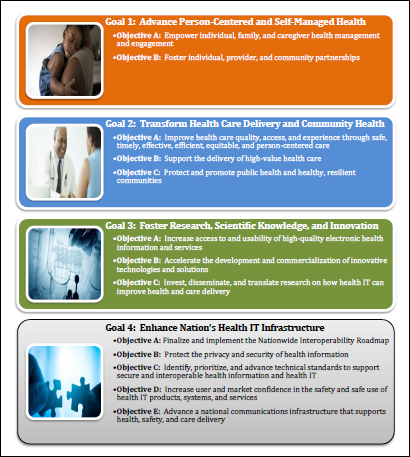
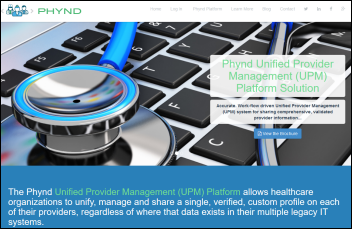

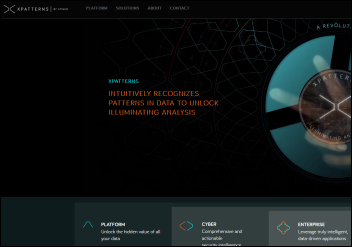



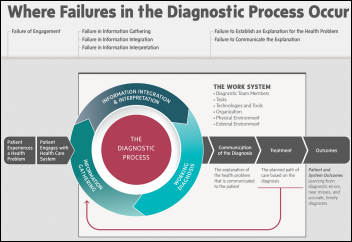

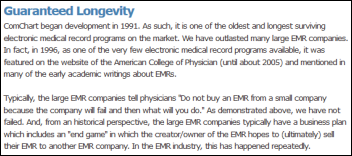
Thank you, Mr. H, for the astute response to “Former Epic.” The comments from folks like this remind me of many evolution skeptics – “I’m not a scientist, but …”
Fare thee well into the sea of mediocrity, Sagacious. You’re where you belong now.
Regarding leaving “sunk costs” behind – any poker player knows this! The money you’ve already put in the pot has no bearing on your next play – it’s a new situation every time with a new set of expected values. Same with golf – ok, I duffed one, now I lie three instead of two, new situation. You could have saved a lot of time and had a lot more fun at the poker tables and on the golf course!
RE: Former Epic. You obviously don’t know Mr. Kenagy, and to anonymously impugn his professional integrity in a public forum is pretty reprehensible. Sign of the times I guess. Epic is no better or worse than any of the other big vendors, they have their own worldview as to any number of issues. No better, no worse than any other large vendor.
Re: Volkswagen.
I just see similarity in how some EHR systems appear to tailor their products’ features more-so to pass the test procedures, versus meeting the regulatory “intent” in production (like Volkswagen did).
@Former Epic
Pretty surprising how Epic consulting companies have all sold out huh? Cipe sold to Cumberland, Vonlay to Huron Consulting, and now Sagacious to Accenture. How is it that Nordic, the company that was founded by a guy with a history of selling off his previous companies, still one of the few that haven’t sold out?
@Ex-Epic
Re Nordic: I think they’re probably making too much money or haven’t gotten a high enough bid yet.
Nordic has a lot of the people who were considered high quality while they were at Epic. Sagacious, not so much.
@Ex-Epic…Nordic’s people are the same people (contractors) that most of the other firms use. Some are good, some are terrible…and they charge a higher rate usually.
Agree with Johnny fever Nordic’s staffing is so arrogant but limit in knowledge.
@Also Ex-Epic
Agreed. The rough hierarchy for quality for Epic consultants from companies started by/focused on Epic:
Vonlay = BlueTree Network > Nordic > Sagacious
I did hear secondhand that Vonlay lost some quality consultants after they sold out but haven’t talked with any Vonlay consultants after they got acquired to confirm this.